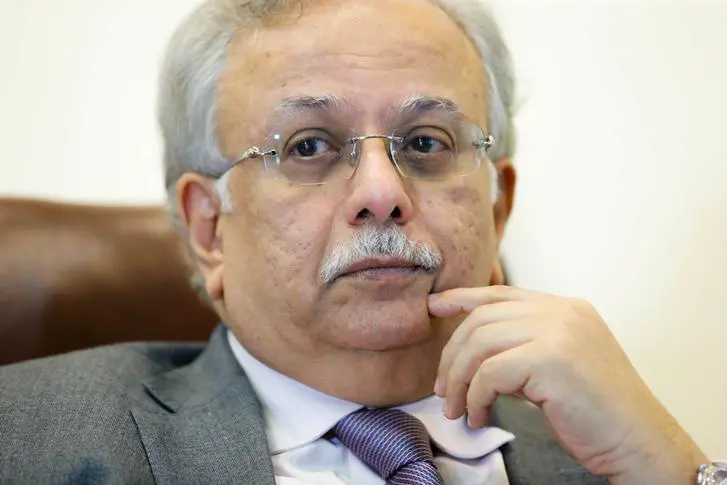PHOTO
He said that the session, titled Responding to New and Evolving Counterterrorism Challenges in the New Decade, aimed to explore good practices, innovative methods and new ideas for confronting ongoing, emerging and evolving challenges, and discuss the priorities and needs of member states in the face of evolving terrorist threats.
It also considered the roles of national agencies, international and regional organizations, civil society, local actors and the private sector in facing the terrorism-related challenges of the new decade, he said, as well as the basic policy tools needed at the national, regional and international levels.
Al-Mouallimi added that the participants discussed the basic practical and operational tools needed to meet new and existing counterterrorism challenges, which include new types of threats and the growing use of the internet to incite and recruit people to commit terrorist acts.
China’s permanent representative to the UN, Zhang Jun, said during the session that despite the progress that has been made in enhancing global cooperation in efforts to combat terrorism, the world still faces terror threats and Daesh remains active in Syria and Iraq.
He also warned that the withdrawal of international forces from Afghanistan has led to a significant deterioration in the security situation in that country. Meanwhile terrorist groups such as Al-Qaeda and Daesh are causing unrest and chaos, he added, at a time when unilateralism and increased polarization are leading to the politicization of human rights issues and creating a vicious cycle of violence and instability.
Zhang also highlighted the fact that the COVID-19 pandemic has caused massive increases in unemployment and poverty around the world, widening the gap between rich and the poor, and leading to a growing number of people becoming marginalized. As the pandemic has exacerbated economic and social challenges, he said, it has created a fertile breeding ground for terrorism.
Gilles de Kerchove, the EU’s counter-terrorism coordinator, said that the war on terror is not over and the EU is keen to strengthen its capabilities to confront the threats. He added that as a result of enhanced cooperation, EU members have strengthened their ability to combat terrorism over the past 20 years, including through the work of the European Counter-Terrorism Office.
Terrorism has been on the rise worldwide since 2001, he said, and international cooperation is crucial to combat it. He also stressed the need to study the types of environment that create the conditions that fuel the spread of terrorism.
Chris Landberg, the US State Department’s deputy counterterrorism coordinator, said: “It is important that we assess the progress we have made together and discuss approaches to combating the ever-evolving terrorist threat.”
He added that his country has made significant progress in its efforts to combat the activities of Al-Qaeda and Daeshh, and dismantle their networks. He pointed out that the threat posed by the two groups continues to evolve — including the growing Daesh presence in West and Central Africa, and Al-Qaeda’s activities in Central Asia through its proxies in East Africa and Southeast Asia — and so the world must remain vigilant and tighten its focus on their recruitment operations.
Closer to home, Landberg said that on June 15 Washington launched a national strategy to combat domestic terrorism, with a particular focus on ethnic terrorism and the connections, especially through the internet, between violent extremists in the US.
Morocco’s permanent representative to the UN, Omar Hilal, said that the defeat of Al-Qaeda and the fall of Daesh marked a new phase of the global fight against terrorism, and that the international community is determined to continue its efforts to counter the threats.
Terrorism has begun to take new and diverse forms, he said, and extremists prey on people in places ravaged by conflict or where state influence is weak.
“Terrorists provide social and basic services to some citizens, to replace the central state,” he said. “This means that these terrorist groups control these areas, and this enhances the terrorist threat and undermines the security of these countries.”
Oscar Fernandez Taranco, the UN’s assistant secretary-general for peacebuilding support, said that terrorist threats have become more globalized and complex as extremists increasingly have the ability to reinvent themselves and recruit in new and innovative ways. The changing nature of the threats they pose has become clear over the past year, he added.
Daesh used the internet to step up its radicalization efforts during the pandemic, which could lead to an increase in terrorist activities in the years ahead, he warned. The UN is concerned about the long-term effects of the pandemic on international peace and security, as well as economic and social effects.
Elena Chernenko, a Russian journalist, talked about the role of the media in combating terrorism and the effectiveness of codes of conduct established by media organizations worldwide.
She also highlighted a recent success as a result of media pressure, saying that on June 23, 1,000 channels linked to terrorism on a popular online platform were blocked as part of an agreement between the Russian government and the service provider to preserve security, peace and privacy for subscribers.
Copyright: Arab News © 2021 All rights reserved. Provided by SyndiGate Media Inc. (Syndigate.info).





















